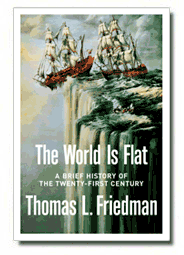
The World is Flat
A Brief History of the Twenty-First Century
By Thomas L. Friedman
Pages 365 (Paperback) Historic Non-Fiction
This title of the book is a bit misleading. Although the entire twenty-first century is mentioned it really is about the last 30 years. The book focuses on the major influences that encouraged globalization in the world. Friedman terms this “making the world flat”.
The first thing to happen was the falling of the Berlin wall. This opened the world up for all the technology that was coming to be able to take hold almost anywhere in the world. Of course, a huge push for globalization came with the personal computer. The personal computer ability to hook up to the internet along with people being able to share and view all this information made the world flatter than ever.
This is not like a typical book that I review. I feel like if I was assigned to read this for a class it would have been drudgery. Since I was reading it by choice it wasn’t. It mainly focuses on the rise of personal computers, the internet and all the companies and ideas that have formed since than. A huge part of this is the ease with which people can communicate and collaborate regardless of their physical location. It doesn’t matter if you are in Bangalore or Burlington, if you have an internet connection you are hooked in.
I found his writing to be easily digested and usually easy to comprehend. The first half of the book focuses on what made the world flat. I was really engaged with that. The next couple chapters touched on education and how American compares to the rest of the world. Being a teacher this was interesting to me. The rest of the book became very dry. It seemed as if it was reiterations of what had been said earlier and was only enforcing what was related rather than adding much that was new.
This copy was labeled 3.0. I’m not sure where the new things are added, but I know that the criticism of earlier books was the writer was entirely pro-globalization. It’s great, can’t stop it, join in or get left behind. The very end of the book does take a look at some of the bad things that can happen because of globalization such as making terrorism easier.
The book ends telling us that for better or worse the world is getting smaller. We have the ability to use this to make the world better or worse. One person can have a lot more impact than ever before. It is up to us to make the best of it.
Intellectual: 4 – This is a technical look at the last 30 years.
Emotional: 1 – Not the point of the book at all.
Long – Term: 3 – Although it will be outdated in a few years as its prediction and relevance, it still does tell us a history of the computer age which can be built on in the future.
8 out of 13. This book is only for someone that is interested. If you find the subject interesting than you will find it worth while. I don’t suggest reading it straight through. If you aren’t interested in the subject you would rate this lower than me, skip it.
Keep Turning Pages